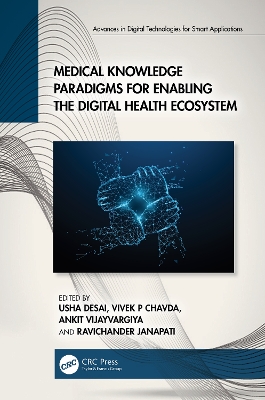Artificial Intelligence in Wireless Sensors and Instruments
 portes grátis
portes grátis
Artificial Intelligence in Wireless Sensors and Instruments
Networks and Applications
Eren, Halit
Taylor & Francis Ltd
11/2024
270
Dura
9781032891262
Pré-lançamento - envio 15 a 20 dias após a sua edição
Descrição não disponível.
Chapter 1: Artificial Intelligence 1.1 Introduction 1.2 Artificial Intelligence Definitions 1.3 Data and Data Handling 1.4 Search Methods and Optimization 1.5 Artificial Intelligence 1.6 Artificial Neural Networks 1.7 Machine Learning 1.8 Classification, Clustering, and Regression 1.9 Artificial Intelligence Learning 1.10 Reinforcement Learning 1.11 Transfer Learning 1.12 Self-Supervised Learning 1.13 Distributed and Collaborative Learning 1.14 Federated Learning 1.15 Deep Learning 1.16 Generative Artificial Intelligence 1.17 Natural Language Processing 1.18 Quality in Machine Learning 1.19 AI Hardware 1.20 AI Software 1.21 AI-Computing 1.22 AI Safety 1.23 AI and Society 1.24 Applications of AI 1.25Conclusions Chapter 2: Wireless Systems 2.1 Introduction 2.2 Wireless Communication Principles 2.3 Electromagnetic Wave Propagation 2.4 RF Propagation Losses 2.5 Frequency Allocation 2.6 Digital Technology in Communications 2.7 RF Components 2.8 RF Transceivers 2.9 Digital RF Components 2.10 Modulation and Demodulation 2.11 Digital Modulation and Demodulation 2.12 Digital Multiplexers 2.13 Digital Duplexers 2.14 Frequency Spreading 2.15 Multiple Access Techniques 2.16 Wireless Modems 2.17 Bridges, Routers, Gateways, and Repeaters 2.18 Packet Radio 2.19 Wireless Networks 2.20 The Zigbee 2.21 The WiFi 2.22 Wireless Machine Type Communication Networks 2.23 IEEE-802.11 Wireless LAN Standards 2.24 The HIPERLAN Standards 2.25 AI in Wireless Systems 2.26 AI in Wireless Radio Networks 2.27 Intelligent Modulation Recognition 2.28 Intelligent Channel Estimation 2.29 Intelligent Channel Measurements 2.30 Intelligent Frequency Hopping Recognition 2.31 AI 5G/6G Networks 2.32 Handling Big Data in Wireless Networks Conclusions Chapter 3: Instruments and Sensor Networks 3.1 Introduction 3.2 Fundamentals of Measurements 3.3 Errors and Uncertainties 3.4 Calibration of Instruments 3.5 Signals and Types of Signals 3.6 Noise and Interference 3.7 Digital Instruments 3.8 Signal Processing Hardware 3.9 Signal Handling 3.10 Digital Data Processing 3.11 Virtual Instrumentation 3.12 Wireless Instruments 3.13 Instrument Software 3.14 Instruments Communications and Networks 3.15 AI in Measurements 3.16 Smart Instrument Systems 3.17 IoT and Measurements 3.18 Sensors and Transducers 3.19 IC Sensors 3.20 Sensors Classification 3.21 Intelligent Sensors 3.22 Sensor Perception 3.23 Sensor Arrays and Multisensors 3.24 Sensor Fusion 3.25 Sensor Standards 3.26 Wireless Sensor Networks 3.27 Conclusions Chapter 4: Applications 4.1 Applications of AI 4.2 AI and Wireless Communications
Este título pertence ao(s) assunto(s) indicados(s). Para ver outros títulos clique no assunto desejado.
ARTIFICIAL INTELLIGENCE IN WIRELESS SENSORS AND INSTRUMENTS;INTELLIGENCE;WIRELESS;SENSORS;INSTRUMENTS
Chapter 1: Artificial Intelligence 1.1 Introduction 1.2 Artificial Intelligence Definitions 1.3 Data and Data Handling 1.4 Search Methods and Optimization 1.5 Artificial Intelligence 1.6 Artificial Neural Networks 1.7 Machine Learning 1.8 Classification, Clustering, and Regression 1.9 Artificial Intelligence Learning 1.10 Reinforcement Learning 1.11 Transfer Learning 1.12 Self-Supervised Learning 1.13 Distributed and Collaborative Learning 1.14 Federated Learning 1.15 Deep Learning 1.16 Generative Artificial Intelligence 1.17 Natural Language Processing 1.18 Quality in Machine Learning 1.19 AI Hardware 1.20 AI Software 1.21 AI-Computing 1.22 AI Safety 1.23 AI and Society 1.24 Applications of AI 1.25Conclusions Chapter 2: Wireless Systems 2.1 Introduction 2.2 Wireless Communication Principles 2.3 Electromagnetic Wave Propagation 2.4 RF Propagation Losses 2.5 Frequency Allocation 2.6 Digital Technology in Communications 2.7 RF Components 2.8 RF Transceivers 2.9 Digital RF Components 2.10 Modulation and Demodulation 2.11 Digital Modulation and Demodulation 2.12 Digital Multiplexers 2.13 Digital Duplexers 2.14 Frequency Spreading 2.15 Multiple Access Techniques 2.16 Wireless Modems 2.17 Bridges, Routers, Gateways, and Repeaters 2.18 Packet Radio 2.19 Wireless Networks 2.20 The Zigbee 2.21 The WiFi 2.22 Wireless Machine Type Communication Networks 2.23 IEEE-802.11 Wireless LAN Standards 2.24 The HIPERLAN Standards 2.25 AI in Wireless Systems 2.26 AI in Wireless Radio Networks 2.27 Intelligent Modulation Recognition 2.28 Intelligent Channel Estimation 2.29 Intelligent Channel Measurements 2.30 Intelligent Frequency Hopping Recognition 2.31 AI 5G/6G Networks 2.32 Handling Big Data in Wireless Networks Conclusions Chapter 3: Instruments and Sensor Networks 3.1 Introduction 3.2 Fundamentals of Measurements 3.3 Errors and Uncertainties 3.4 Calibration of Instruments 3.5 Signals and Types of Signals 3.6 Noise and Interference 3.7 Digital Instruments 3.8 Signal Processing Hardware 3.9 Signal Handling 3.10 Digital Data Processing 3.11 Virtual Instrumentation 3.12 Wireless Instruments 3.13 Instrument Software 3.14 Instruments Communications and Networks 3.15 AI in Measurements 3.16 Smart Instrument Systems 3.17 IoT and Measurements 3.18 Sensors and Transducers 3.19 IC Sensors 3.20 Sensors Classification 3.21 Intelligent Sensors 3.22 Sensor Perception 3.23 Sensor Arrays and Multisensors 3.24 Sensor Fusion 3.25 Sensor Standards 3.26 Wireless Sensor Networks 3.27 Conclusions Chapter 4: Applications 4.1 Applications of AI 4.2 AI and Wireless Communications
Este título pertence ao(s) assunto(s) indicados(s). Para ver outros títulos clique no assunto desejado.







